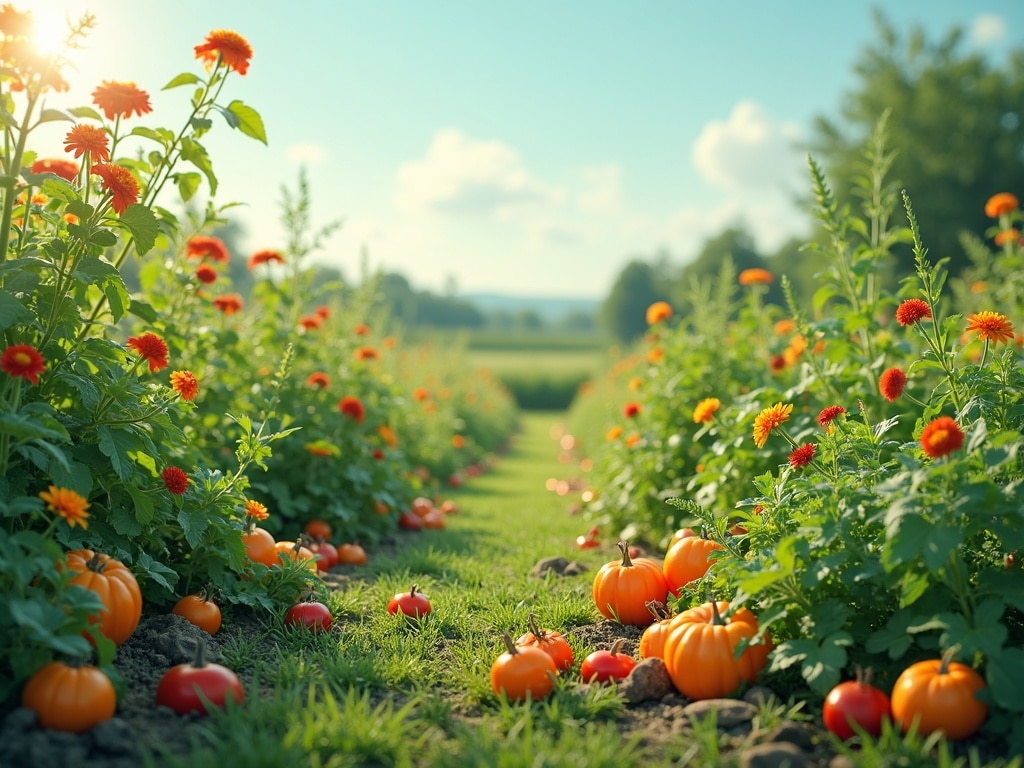Natural Pest Control for Vegetable Gardens: Your DIY Guide to a Thriving Harvest
Introduction: Reaping the Rewards of a Pest-Free Garden
Imagine biting into a sun-ripened tomato, bursting with flavor, knowing you nurtured it from seed to table without a single synthetic pesticide. This dream is entirely achievable with natural pest control methods. In this comprehensive guide, we'll dive into the world of organic gardening, equipping you with the knowledge and techniques to safeguard your vegetable garden naturally, ensuring a bountiful and healthy harvest.
Understanding Common Garden Pests
Knowing your enemy is half the battle. Before you can effectively implement natural pest control for vegetable gardens, you need to identify the common culprits. Let's explore some of the most prevalent pests and the telltale signs they leave behind:
- Aphids: Tiny, pear-shaped insects that cluster on stems and leaves, sucking plant sap. Look for distorted leaves, sticky honeydew (their excrement), and sooty mold.
- Cabbage Worms/Loopers: Green caterpillars that feast on cabbage, broccoli, and other leafy greens, leaving behind ragged holes.
- Tomato Hornworms: Large, green caterpillars with a distinctive horn, known for their voracious appetite for tomato plants.
- Squash Bugs: Flat, brown or gray bugs that suck sap from squash vines, causing wilting and yellowing.
- Cucumber Beetles: Small, striped or spotted beetles that feed on cucumber, melon, and squash plants, spreading diseases like bacterial wilt.
- Slugs and Snails: Mollusks that emerge at night to devour leaves, leaving behind slimy trails.
Regular garden walks and close inspection of your plants are crucial for early detection. The sooner you identify a pest problem, the easier it will be to control it naturally.
The Importance of Natural Pest Control
Why choose natural pest control methods over conventional chemical pesticides? The answer is multifaceted, encompassing benefits for your health, the environment, and the overall ecosystem.
- Health Benefits: Natural pest control eliminates the risk of exposing yourself and your family to harmful chemical residues on your food.
- Environmental Protection: Synthetic pesticides can contaminate soil, water, and air, harming beneficial insects, birds, and other wildlife. Natural methods are far less disruptive to the environment.
- Ecosystem Balance: Chemical pesticides can disrupt the delicate balance of the garden ecosystem, killing beneficial insects that naturally prey on pests. Natural methods work with nature, promoting a healthy and resilient garden.
- Promoting Biodiversity: An organic approach to pest control encourages a more diverse range of plants and insects to thrive within your local environment, improving the resilience of the whole, and the sustainability of your food production.
Choosing natural pest control is an investment in a healthier, more sustainable future.
Prevention is Key: Building a Resilient Garden
The best defense against pests is a healthy, thriving garden. By creating a balanced ecosystem, you can minimize pest problems from the outset. Here are some key preventative strategies:
- Healthy Soil: Rich, well-drained soil is the foundation of a healthy garden. Amend your soil with compost and other organic matter to improve its structure, fertility, and water-holding capacity. Healthy plants are more resistant to pests and diseases.
- Crop Rotation: Avoid planting the same crop in the same location year after year. Crop rotation helps to break pest and disease cycles in the soil.
- Companion Planting: Plant certain vegetables and herbs together to deter pests or attract beneficial insects. For example, basil repels tomato hornworms and whiteflies, while marigolds repel nematodes and other soil pests.
- Water Wisely: Water deeply and infrequently, rather than shallowly and frequently, to encourage strong root growth and reduce fungal diseases. Water in the morning to allow foliage to dry before nightfall.
- Weed Control: Weeds can harbor pests and diseases. Keep your garden free of weeds by hand-pulling, hoeing, or mulching.
DIY Natural Pest Control Solutions
When prevention isn't enough, several effective homemade sprays and solutions can help control pests naturally. Here are a few popular options:
- Neem Oil Spray: Neem oil is a broad-spectrum insecticide, fungicide, and miticide derived from the neem tree. It disrupts the life cycle of many common garden pests. Mix 2 tablespoons of neem oil with 1 gallon of water and a few drops of liquid soap (as an emulsifier). Spray plants thoroughly, especially the undersides of leaves, every 7-14 days.
- Garlic Spray: Garlic has potent insect-repelling properties. To make garlic spray, blend 2-3 cloves of garlic with 1 quart of water. Let the mixture sit overnight, then strain it through a cheesecloth. Dilute the garlic water with 2 quarts of plain water and spray plants thoroughly.
- Pepper Spray: Capsaicin, the active ingredient in chili peppers, is a powerful irritant to many pests. To make pepper spray, combine 1 tablespoon of cayenne pepper with 1 quart of water and a few drops of liquid soap. Spray plants carefully, avoiding contact with your eyes and skin.
- Insecticidal Soap: Soap disrupts the cell membranes of soft-bodied insects like aphids, whiteflies, and spider mites. Use a commercial insecticidal soap or make your own by mixing 1-2 tablespoons of liquid soap (not detergent) with 1 gallon of water. Spray plants thoroughly, ensuring good coverage.
Important Note: Always test any homemade spray on a small area of the plant before applying it to the entire plant. Apply sprays in the early morning or late evening to avoid burning foliage in direct sunlight.
Beneficial Insects and Predators: Your Garden Allies
Instead of just killing pests, consider attracting their natural enemies. Beneficial insects and predators can help keep pest populations in check, creating a balanced ecosystem in your garden. Here are some key allies to attract:

- Ladybugs: Voracious predators of aphids, spider mites, and other soft-bodied insects. Attract them by planting dill, fennel, and yarrow.
- Lacewings: Their larvae are fierce predators of aphids, mealybugs, and whiteflies. Attract them by planting dill, coriander, and sunflowers.
- Parasitic Wasps: Tiny wasps that lay their eggs inside pest insects, eventually killing them. Attract them by planting dill, parsley, and yarrow.
- Hoverflies: Their larvae feed on aphids. Attract them by planting dill, fennel, and coriander.
Avoid using broad-spectrum insecticides that can harm beneficial insects. Provide a source of water, such as a birdbath or shallow dish, to attract these helpful predators to your garden.
Physical Barriers and Traps
In addition to sprays and beneficial insects, physical barriers and traps can provide effective pest control:
- Row Covers: Lightweight fabric covers that protect plants from pests while allowing sunlight and water to penetrate. Use them to protect seedlings and vulnerable plants from insects like cabbage moths and flea beetles.
- Netting: Bird netting can protect fruit and vegetables from birds and larger insects.
- Sticky Traps: Yellow sticky traps attract and trap flying insects like aphids, whiteflies, and fungus gnats.
- Beer Traps: Bury a shallow container of beer in the ground, with the rim level with the soil surface. Slugs and snails will be attracted to the beer and drown.
- Copper Tape: Place copper tape around the base to your plants or on a raised bed to deter slugs and snails.
Natural Pest Control for Specific Vegetables
Different vegetables are susceptible to different pests and a varied approach to pest control might be necessary. Let's explore some common vegetable crops and the specific natural remedies that work best for each:
- Tomatoes: Tomato hornworms can be hand-picked or controlled with Bacillus thuringiensis (Bt), a natural bacterium that paralyzes caterpillars. Aphids can be controlled with insecticidal soap or neem oil.
- Peppers: Aphids and flea beetles are common pests of peppers. Use insecticidal soap or neem oil to control aphids, and row covers to protect plants from flea beetles.
- Cucumbers: Cucumber beetles can spread bacterial wilt. Use row covers to protect plants and hand-pick beetles as they appear.
- Cabbage: Cabbage worms and loopers can devastate cabbage crops. Use row covers to prevent moths from laying eggs, and Bacillus thuringiensis (Bt) to control caterpillars.
- Squash: Squash bugs can damage squash vines. Hand-pick bugs and their eggs, and use row covers to protect plants.
Maintaining a Pest-Free Garden: Vigilance is Key
Natural pest control is an ongoing process that requires regular monitoring and adjustments. Here are some best practices for maintaining a pest-free garden:
- Regular Inspection: Inspect your plants frequently, at least once a week, for signs of pests or diseases.
- Early Intervention: The sooner you identify a pest problem, the easier it will be to control it.
- Record Keeping: Keep a garden journal to track pest problems and the methods you used to control them. This will help you identify patterns and adjust your strategies accordingly.
- Rotation and Adjustment: Rotate your pest control methods to prevent pests from developing resistance.
- Observation: Understanding how the pests interact with your crop gives you the chance to interrupt their lifecycle and impact.
Consistency and vigilance are essential for long-term success with natural pest control.
Troubleshooting Common Problems
Sometimes, even with the best efforts, natural pest control methods may not work as expected. Here are some potential causes and solutions:
- Incorrect Identification: Make sure you've correctly identified the pest. Different pests require different control methods.
- Insufficient Application: Ensure you're applying sprays thoroughly, reaching all parts of the plant, including the undersides of leaves.
- Environmental Factors: Weather conditions, such as rain or high humidity, can affect the effectiveness of sprays. Reapply after rain.
- Severe Infestation: If you have a severe infestation, you may need to use a combination of methods, or accept some losses.
- Lack of Beneficial Insects: If you don't have enough beneficial insects in your garden, consider purchasing them from a reputable supplier.
Don't be discouraged if your initial efforts aren't successful. Persistence and experimentation are key to finding what works best in your garden.
Resources and Further Reading
Want to learn more about natural pest control and organic gardening practices? Here are some valuable resources:
- Your local agricultural extension office
- Organic gardening organizations
- Books and articles on organic gardening and pest control
- Online gardening forums and communities
- Consult The Lazy Gardener's Guide to Abundant Organic Vegetable Production and other resources to improve your understanding of organic gardening!
By embracing natural pest control, you can create a thriving vegetable garden that nourishes both your body and the environment.

